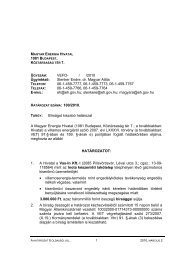Management of the Hungarian Energy Office - Magyar Energia Hivatal
Management of the Hungarian Energy Office - Magyar Energia Hivatal
Management of the Hungarian Energy Office - Magyar Energia Hivatal
Create successful ePaper yourself
Turn your PDF publications into a flip-book with our unique Google optimized e-Paper software.
hungarian energy <strong>of</strong>fice<br />
Small customers forced to enter <strong>the</strong> free market after <strong>the</strong> public<br />
utility supply ceased in 2008 usually stayed with <strong>the</strong>ir former<br />
supplier who supplied <strong>the</strong>se customers in <strong>the</strong> possession <strong>of</strong> a<br />
trading license.<br />
The companies with universal service license, which are E.ON<br />
<strong>Energia</strong>szolgáltató Zrt., Budapesti Elektromos Művek Nyrt.,<br />
Észak-magyarországi Áramszolgáltató Nyrt. and Dél-magyarországi<br />
Áramszolgáltató Nyrt., are interested also in <strong>the</strong><br />
operation <strong>of</strong> distribution networks through <strong>the</strong>ir subsidiaries<br />
or joint ventures. Universal service suppliers are owned by<br />
three multinational companies, E.ON, RWE and EdF, which<br />
supplied customers not only through <strong>the</strong>ir affi liates entitled<br />
to provide universal service, but also through <strong>the</strong>ir trading<br />
subsidiaries established with a view to perform free market<br />
activities. Thus, <strong>the</strong> total market share <strong>of</strong> <strong>the</strong>se companies<br />
within <strong>the</strong> total domestic retail market was very signifi cant,<br />
approximately 77% even 6 years after <strong>the</strong> market opening in<br />
2003.<br />
Despite <strong>the</strong> strong market concentration, <strong>the</strong>re were traders<br />
entering <strong>the</strong> market, who also undertook to supply customers<br />
in addition to <strong>the</strong>ir domestic wholesale activity. Among <strong>the</strong>se<br />
<strong>the</strong>re are both multinational companies with several subsidiaries<br />
in <strong>the</strong> region, and small domestic traders. In 2009, <strong>the</strong>re were<br />
Eurocent/kWh<br />
300<br />
250<br />
200<br />
150<br />
100<br />
50<br />
0<br />
Denmark<br />
Germany<br />
Italy<br />
Ireland<br />
Belgium<br />
Austria<br />
Ne<strong>the</strong>rlands<br />
Luxembourg<br />
Malta<br />
Sweden<br />
Spain<br />
annual report 2009 | 20<br />
Norway<br />
Cyprus<br />
Slovakia<br />
Portugal<br />
Hungary<br />
United Kingdom<br />
Slovenia<br />
tariffs excluding taxes taxes<br />
Czech Republic<br />
Finland<br />
France<br />
Greece<br />
Croatia<br />
Turkey<br />
Poland<br />
Latvia<br />
Source: EUROSTAT<br />
22-24 traders operating on <strong>the</strong> retail market, whose owners<br />
were fully independent from any <strong>of</strong> <strong>the</strong> domestic distribution<br />
network companies. Their market share was approximately<br />
23%, but only 17% excluding <strong>the</strong> traders belonging to MVM<br />
group. Some <strong>of</strong> <strong>the</strong> traders were established to supply only a<br />
given circle <strong>of</strong> customers, primarily a company group.<br />
In 2009, <strong>the</strong> market share <strong>of</strong> <strong>the</strong> companies formerly being<br />
public utility suppliers continued to decrease. However, <strong>the</strong>ir<br />
market position is still very strong, since 95% <strong>of</strong> as much<br />
as hundred thousand users supplied in <strong>the</strong> framework <strong>of</strong><br />
universal service (primarily small and medium size customers<br />
not entitled for universal service) are supplied by <strong>the</strong> traders<br />
<strong>of</strong> <strong>the</strong> three big incumbent suppliers. If <strong>the</strong> market position<br />
<strong>of</strong> suppliers and traders are calculated according to <strong>the</strong><br />
consumption <strong>of</strong> <strong>the</strong>ir users instead <strong>of</strong> <strong>the</strong> number <strong>of</strong> <strong>the</strong> users,<br />
this rate is much smaller: former public utility suppliers and<br />
<strong>the</strong>ir joint ventures supplied 59% <strong>of</strong> free market consumption<br />
in 2009. Figures clearly reveal that new traders continue to vie<br />
only for large customers.<br />
In 2009, domestic prices in comparison with <strong>the</strong> prices <strong>of</strong> <strong>the</strong><br />
European Union were in <strong>the</strong> middle range in <strong>the</strong> residential<br />
customer segment; with regard to prices to be paid by large<br />
industrial customers with consumption between 20 and 70<br />
GWh, Hungary became one <strong>of</strong> <strong>the</strong> countries<br />
consuming electricity at <strong>the</strong> highest prices in<br />
2009. (Figures 3 and 4).<br />
Romania<br />
Lithuania<br />
Estonia<br />
Bulgaria<br />
Figure 3 Comparison <strong>of</strong> electricity tariffs to be paid by residential users in <strong>the</strong><br />
EU27 (2500 – 5000 kWh annual consumption; fi rst half <strong>of</strong> 2009)<br />
Eurocent/kWh<br />
200<br />
180<br />
160<br />
140<br />
120<br />
100<br />
80<br />
60<br />
40<br />
20<br />
0<br />
Denmark<br />
Hungary<br />
Slovakia<br />
Malta<br />
Germany<br />
Cyprus<br />
United Kingdom<br />
Ne<strong>the</strong>rlands<br />
Belgium<br />
Italy<br />
Ireland<br />
Czech Republic<br />
Latvia<br />
Spain<br />
tariffs excluding taxes taxes<br />
Turkey<br />
Croatia<br />
Norway<br />
Portugal<br />
Luxembourg<br />
Finland<br />
Source: EUROSTAT<br />
Figure 4 Comparison <strong>of</strong> electricity tariffs to be paid by non-residential users<br />
with annual consumption <strong>of</strong> 20 – 70 GWh in <strong>the</strong> EU27 (fi rst half <strong>of</strong> 2009)<br />
Poland<br />
Lithuania<br />
France<br />
Greece<br />
Romania<br />
Slovenia<br />
Bulgaria<br />
Estonia<br />
Sweden<br />
Measures to prevent abuse <strong>of</strong> market power<br />
The ex post authority tasks <strong>of</strong> competition<br />
surveillance specifi ed in <strong>the</strong> Act 57 <strong>of</strong> 1996 on<br />
Prohibition <strong>of</strong> Unfair and Restrictive Market<br />
Practices governing <strong>the</strong> posterior investigation<br />
and sanctioning <strong>of</strong> market abuses are performed<br />
by <strong>the</strong> <strong>Hungarian</strong> Competition Authority (Gazdasági<br />
Versenyhivatal, hereinafter GVH). The<br />
ex-ante interventional rights specifi ed in <strong>the</strong><br />
Electricity Act, which aim to prevent market<br />
abuses are exercised by HEO.<br />
The Electricity Act applies special rules to avoid<br />
market abuses. It introduced <strong>the</strong> regulatory<br />
practice concerning licensees <strong>of</strong> signifi cant market<br />
power, which, although new in <strong>the</strong> regulation<br />
<strong>of</strong> <strong>the</strong> electricity industry, was already a known<br />
tool in <strong>the</strong> telecommunications sector. The<br />
Electricity Act and <strong>the</strong> associating enforcement<br />
decree include detailed rules on <strong>the</strong> designation<br />
<strong>of</strong> licensees as having signifi cant market power<br />
and <strong>the</strong>ir treatment.<br />
Within <strong>the</strong> framework <strong>of</strong> <strong>the</strong> new regulation,<br />
HEO as a supervisory authority may impose<br />
special additional obligations (e.g. selling<br />
electricity on public capacity auctions, costbased<br />
pricing, preparation <strong>of</strong> a bidding sample<br />
etc.) on all licensees including both wholesale




